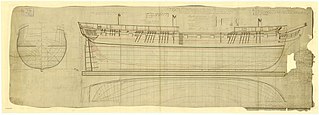Related Research Articles
Britannia may refer to any one of a large number of ships:

HMS Charybdis was a Royal Navy Cruizer-class brig-sloop built by Mark Richards and John Davidson at Hythe, and launched in 1809. She captured two American prizes during the War of 1812 before she was laid up in 1815 and sold in 1819. She apparently then became the whaler Greenwich, which made three voyages for Samuel Enderby & Sons and one for Daniel Bennett & Son. She was wrecked in the Seychelles in 1833 on her fourth whaling voyage.
HMS Whiting was a Royal Navy Ballahoo-class schooner of four 12-pounder carronades and a crew of 20. The prime contractor for the vessel was Goodrich & Co., in Bermuda, and she was launched in 1805. She was a participant at the Battle of Basque Roads. A French privateer captured her at the beginning of the War of 1812, shortly after the Americans had captured and released her in the first naval incident of the war.
Coromandel was the French prize Modeste, captured in 1793 and refitted at Chittagong, British India. She made two voyages transporting convicts to Port Jackson, the first for the British East India Company (EIC). A French privateer captured her in 1805 but she had returned to British hands before 1809. An American privateer captured her in 1814 but this time the British Royal Navy recaptured her within days. She foundered in Indian waters on 6 February 1821.
Countess of Harcourt was a two-decker, teak merchant ship launched at Prince of Wales's Island in 1811, and sold in Great Britain in 1814. An American privateer captured her in 1814, but the British recaptured her in 1815. Later, she made five trips transporting convicts to Australia. Between the third and fourth of these, she undertook a voyage to China and Nova Scotia while under charter to the British East India Company (EIC). She was wrecked in late 1830.
HMS Decouverte was the French schooner Eclipse, launched in 1804, that was captured in 1806. The Royal Navy took her into service as HMS Decouverte. She served in the Caribbean, where she captured two privateers, one French and one American. She was sold in 1816.
Many ships have borne the name Isabella:
A number of vessel were named Caroline:
Many vessels have been named Comet, after the astronomical object comet.
HMS Plumper was launched in 1807. She captured three small American privateers early in the War of 1812 but was wrecked in December 1812.
Asia was launched at Liverpool in 1798. She competed four voyages for the British East India Company (EIC), and wrecked on her fifth. During the second she transported EIC troops to Macao to augment the Portuguese forces there, but the authorities there refused them permission to land. She was wrecked in 1809 on the outbound leg of a voyage to Madras and Bengal.
Several ships have borne the name Caledonia for Caledonia:

HMS Barrosa was launched in 1812 for the Royal Navy and served during the War of 1812 during which she captured several prices. After the war she spent a decade or so (1823–1833) on harbour duties. The navy sold Barrosa in 1841.
HMS Racer was the American schooner Independence, launched in 1811 in New York, that the British Royal Navy captured in 1812 and took into service. She was wrecked in the Florida Straits on 10 October 1814.
Lion was launched in 1803 in Turkey, or 1802 in Spain. British owners acquired her in 1809, probably by purchase of a prize. She was a merchantman and letter of marque. She captured an American privateer in a notable single-ship action in 1813, some months before Lion was wrecked in 1813.
Several vessels have been named Princess Charlotte for one of the many Princesses Charlotte:
Several vessels have been named Prince Regent for George IV, of England, who was Prince regent from 1811 to his accession to the throne in 1826:
References
- Emmons, George Foster (1853). The navy of the United States, from the commencement, 1775 to 1853; with a brief history of each vessel’s service and fate ... Comp. by Lieut. George F. Emmons ... under the authority of the Navy Dept. To which is added a list of private armed vessels, fitted out under the American flag ... also a list of the revenue and coast survey vessels, and principal ocean steamers, belonging to citizens of the United States in 1850. Washington: Gideon & Co.